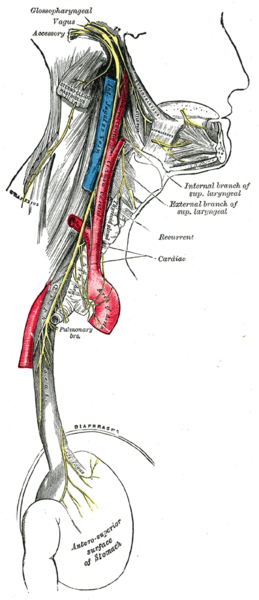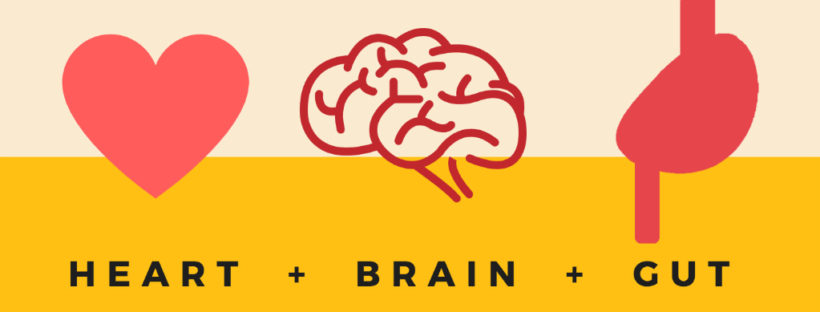As a side effect of our high performance and demanding lifestyles, stress has become a commonplace issue in modern society.
“80% of workers feel stress on the job and nearly half say they need help in learning how to manage stress. And 42% say their co-workers need such help.” – American Institute of Stress.
“Stress levels in the workplace are rising with 6 in 10 workers in major global economies experiencing increased workplace stress. With China (86%) having the highest rise in workplace stress.” – The Regus Group
According to a 2016 survey by the American Psychological Association, among the top stressors are money, work and economy followed by personal health concerns; and the top three forms of coping with stress include exercise/walking, going online or watching tv.
So,
What is the vagus nerve and what does it have to do with stress?
The vagus nerve is the longest nerve of the autonomic (relating to involuntary or unconscious actions such as heartbeat and digestion) nervous system in your body, connecting your brain to your stomach, heart and many other organs. It is also the main component of the parasympathetic nervous system.

The vagus nerve in yellow.
The parasympathetic nervous system is known as the “rest and digest” system. When it is functioning healthily, it plays a key role in moving you from a stress and anxiety, “fight or flee” state, into a restful state.
This changes the chemicals in your body. Adrenaline and cortisol levels drop and neurotransmitters such as acetylcholine and GABA are released to help the body go into the parasympathetic mode or a relaxed state.
Parasympathetic nervous system – “rest & digest”
Sympathetic nervous system – “fight or flee”
Stress stimulates the sympathetic nervous system to override the parasympathetic nervous system.
Prolonged stress keeps the body in a sympathetic state, weakening vagus nerve function through constant suppression.
This leads to a laundry list of complications such as:
Obesity
Anorexia
Bulimia
IBS (Irritable Bowel Syndrome)
esophageal reflux
Bradycardia (Abnormally Slow Heart Rate)
Difficulty swallowing
Difficulty breathing
delayed gastric emptying
Vasovagal syncope
B12 deficiency
Chronic inflammation
Seizures
Depression
Anxiety
Difficulty recovering from PTSD
Difficulty recovering from stressful situations
Difficulty making memories
Brain fog
Mood swings
Heart palpitations
Feelings of being disconnected to others
What else does the Vagus Nerve do?
“The word “vagus” means “wanderer” in Latin, describing how this nerve wanders all over the body connecting various organs via neural communication Including your tongue, pharynx, vocal chords, lungs, heart, stomach, intestines and glands that produce anti-stress enzymes and hormones (like Acetylcholine, Prolactin, Vasopressin, Oxytocin), influencing digestion, metabolism and the relaxation response.
80-90% of the nerve fibers in the vagus nerve serve the purpose of communicating the state of your viscera up to your brain.
Because of the communication between the gut, heart and brain. The vagus nerve plays a role in intuition, or “gut instinct”.
When the “tone” of your vagus nerve is working optimally, your body can relax faster after stress.
How can I balance or “tone” my vagus nerve?
The vagus nerve initiates your body’s relaxation response, so if it’s not working properly, you will stay in a prolonged sympathetic fight or flight state.
A balanced or toned vagal nerve also leads to positive emotions and feelings of positive social connection.
Here are some techniques you can use to stimulate your vagus nerve for optimal function:
Cold Exposure
Any kind of acute exposure to cold increases vagus nerve activation. As your body adjusts to cold, sympathetic system declines and parasympathetic nervous system increases.
Slow and deep Breathing
Breathing communicates your body’s state of being to the brain. When under an attack, from a predator per say, your breathing will increase as you prepare for “fight or flight”.
In a relaxed state, your breathing is naturally slower. You can hack your state of being by changing the rate and depth of your breathing.
On average you take about 10-14 breaths per minute. Slowing this down to about 6 deep breaths per minute will help activate your vagus nerve by increasing the sensitivity of “baroreceptor” neurons.
Your heart and neck contain neurons called “baroreceptors”. These baroreceptors detect your blood pressure and send a signal to the brain to activate your vagus nerve to lower blood pressure and heart rate.
The sensitivity of these baroreceptors can be enhanced with deep breathing. This increases the likelihood of communication for vagal activation to lower heart rate and blood pressure, putting your body into a parasympathetic state. This helps to curb anxiety much more quickly.
When breathing consciously slower, breathe in deeply from your diaphragm. Breathe into your belly and consciously expand it outward.
Exhale slowly.
Singing, Humming, Chanting & Gargling
Any action that stimulates the muscles and nerves around the throat and initiates the work of a vagal pump, sending waves through it.
This includes singing, humming, gargling and chanting.
Chanting a mantra such as “om” in meditation has a compound effect of stimulating the vagus nerve through slow breathing and vagal activation through chanting vibration.
Acupuncture
Ear acupuncture specifically, has proven to have the most stimulating effects on the vagal nerve and has also proven to treat neurogenerative diseases through vagal nerve regulation.
Probiotics
In a study done on animals, the introduction of the probiotic Lactobacillus Rhamnosus created positive changes in the GABA receptors of the brain, a reduction in stress hormones and less depression and anxiety behavior. It led to the conclusion that the bacteria in the gut created beneficial changes that were facilitated to the entire body and brain by the vagus nerve.
Meditation
Not all forms of meditation have been proven to stimulate the vagus nerve enough to produce measurable results. There are two types of meditation shown to stimulate the vagus nerve.
Loving-kindness meditation increases vagal tone. To do loving-kindness meditation, or Metta meditation, simply direct feelings of goodwill to others while in meditation.
Om chanting meditation also stimulates the vagus nerve.
Omega 3
Omega 3 Fatty Acids have been shown to reduce heart rate and increase heart rate variability. Since a higher heart rate variability (HRV) measures healthy vagal tone, this led to the conclusion that Omega 3’s increase vagal tone.
Exercise
Mild exercise stimulates gut flow. Gut flow is mediated by the vagus nerve, meaning exercise stimulates the vagus nerve as well.
Tensing the stomach muscles also stimulates the vagus nerve.
Zinc
Zinc has been shown to be an essential mineral for health and to manage anxiety. On a study done on rats, administering zinc showed vagus nerve stimulation.
Massage
The vagus nerve can be stimulated by massaging several specific areas of the body. Foot reflexology increases vagal modulation and activity.
Socializing and laughing
Researchers have found that experiencing or reflecting upon positive social connections increases positive emotions and improves vagal tone.
Laughter has also been shown to increase heart-rate variability and improve mood.
How can I know if I have a strong vagal tone?
Doctors can determine the “tone” or “strength” of your vagus nerve (and your cardiac health) by measuring the time between your individual heartbeats, and then plotting this on a chart over time.
This is known as your heart rate variability or HRV.
When your HRV is high, your vagal tone is also high. They are correlated with each other.
You can also measure vagal tone with heart rate and breathing rate monitoring.
Another effect of having a high vagal tone is feeling a closeness to others and having more altruistic tendencies or behavior.
If you are interested in measuring your HRV, you can measure it with this.
References:
https://selfhacked.com/blog/28-ways-to-stimulate-your-vagus-nerve-and-all-you-need-to-know-about-it/
The Biology of Kindness: How It Makes Us Happier and Healthier
http://www.brainprotips.com/vagus-nerve-symptoms/
http://www.gwinnett.k12.ga.us/LilburnES/PromoteGA/biochemistry/Brain_CNS.html
http://mentalfloss.com/article/65710/9-nervy-facts-about-vagus-nerve
http://www.gostress.com/stress-facts/
https://www.apa.org/news/press/releases/stress/2016/coping-with-change.pdf
https://en.wikipedia.org/wiki/Vagus_nerve
https://en.wikipedia.org/wiki/Vagal_tone
https://www.heartmath.org/articles-of-the-heart/science-of-the-heart/article-explains-

